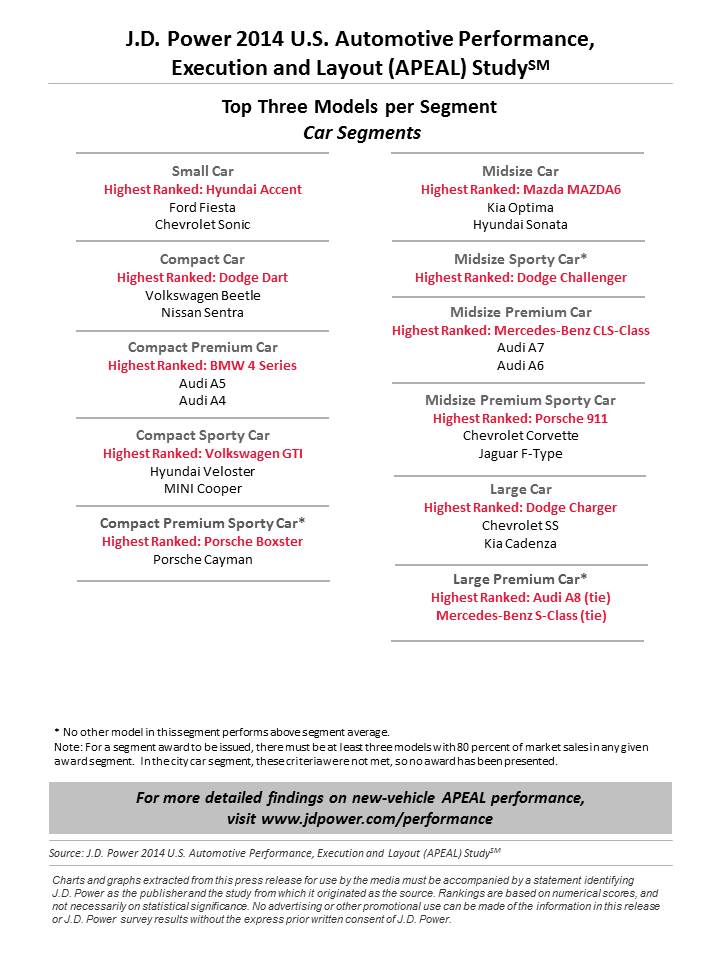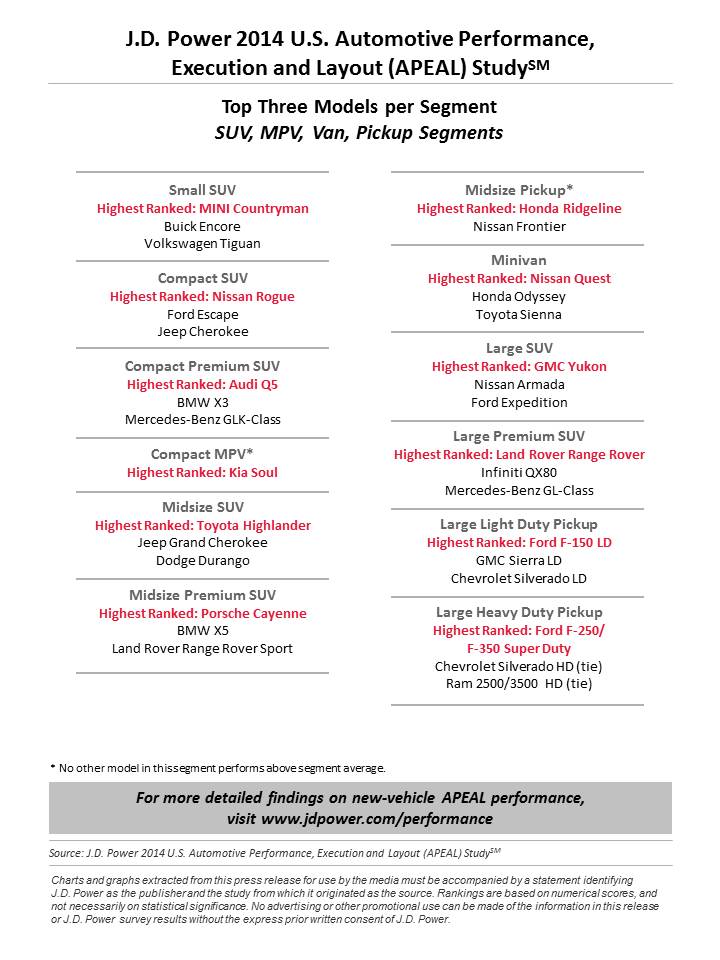Although manufacturers are putting more and more technologies and functionality in their new and redesigned models, satisfaction with these features is not significantly higher among owners of those models than among owners of carryover models, according to the J.D. Power 2014 U.S. Automotive Performance, Execution and Layout (APEAL) StudySM released today.
The APEAL Study, now in its 19th year, serves as the industry benchmark for new-vehicle appeal. Owners evaluate their vehicle across 77 attributes, which combine into an overall APEAL score that is measured on a 1,000-point scale.
The study finds that APEAL scores for all-new and redesigned models continue to see a lift in APEAL scores compared with carryover models (805 vs. 791, respectively). However, while satisfaction in areas such as fuel economy and the feel and styling of the interior is higher among owners of all-new and redesigned models than among owners of carryover models, there is less differentiation in terms of the usefulness of the controls and functions for navigation, voice recognition and other technology applications.
“Manufacturers often look to new features and technologies to keep their vehicles fresh and attractive, but designing systems that consumers find intuitive and easy to use has been a challenge,” said Renee Stephens, vice president of U.S. automotive at J.D. Power. “Newly launched models surpass carryovers in impressing owners with the look and feel of the vehicle. But as we also see in our 2014 Initial Quality Study, owners are not as comfortable with the functionality of the features. To differentiate new models from the pack, automakers must continue to design systems that are not just attractive, but also intuitive and easy to use.”
The overall APEAL score in 2014 averages 794, which is a 1-point decrease from 2013. Fuel economy is the only category in which there has been improvement year over year (+6 points), which is due in part to an average decline of 3 percent in fuel prices during the survey period, compared with 2013. Owner-reported average mpg also improves to 25.0 mpg from 24.5 in 2013, resulting in more favorable perceptions of both driving range and mileage.
“Despite improvements this year, fuel economy continues to be the lowest-scoring category in the study by a wide margin,” said Stephens. “While many factors influence the fuel performance of a vehicle, an important factor is how the engine and transmission are tuned by the manufacturers. Automakers must find the right balance between owner expectations of fuel economy and areas that affect the driving experience, such as horsepower and transmission performance, which is not an easy task. Customers are not always happy with the trade-off between those characteristics.”
2014 APEAL Rankings Highlights
Porsche is the highest-ranked nameplate in APEAL for the 10th consecutive year. Hyundai ranks highest among non-premium brands in the study. Hyundai is also the highest-ranked non-premium brand in the J.D. Power 2014 Initial Quality StudySM (IQS), marking the first time a nameplate has ranked highest among non-premium brands in both APEAL and IQS in the same year.
Both Dodge and Porsche receive three segment awards each: Dodge for the Challenger, Charger and Dart; and Porsche for the 911, Boxster and Cayenne.
Receiving two segment awards each are Audi, Ford, Mercedes-Benz and Nissan: Audi for the A8 (tie) and Q5; Ford for the F-150 LD and F-250/F-350 Super Duty; Mercedes-Benz for the CLS-Class and S-Class (tie); and Nissan for the Rogue and Quest.
Also receiving awards are the BMW 4 Series; GMC Yukon; Honda Ridgeline; Hyundai Accent; Kia Soul; Land Rover Range Rover; Mazda MAZDA6; MINI Countryman; Toyota Highlander; and Volkswagen GTI.
.jpg)

